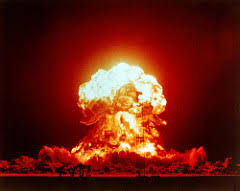The International Campaign to Abolish Nuclear Weapons won the Nobel Peace Prize on Friday, a forceful show of support for a grassroots effort that seeks to pressure the world’s nuclear powers to give up the weapons that could destroy the planet.
The choice of the little-known coalition of disarmament activists put the Nobel committee again at the forefront of geopolitics at a time when fears are rising over North Korea’s nuclear and missile program and the invective it has drawn from U.S. President Donald Trump.
The committee cited the tiny, Geneva-based ICAN for its work that led to the Treaty on the Prohibition of Nuclear Weapons that was reached in July at the United Nations.
The group “has been a driving force in prevailing upon the world’s nations to pledge to cooperate ... in efforts to stigmatize, prohibit and eliminate nuclear weapons,” Norwegian Nobel Committee chairwoman Berit Reiss-Andersen said in the announcement.
More than 120 countries approved the treaty over opposition from nuclear-armed countries and their allies. In a statement issued after the Nobel was announced, the U.S. reiterated its position that the treaty “will not result in the elimination of a single nuclear weapon.”
The network coordinator for the International Campaign to Abolish Nuclear Weapons said the Nobel Peace Prize awarded to the organization “shines a needed light” on the pathway towards a world free of nuclear weapons. (Oct. 6).
The treaty requires all ratifying countries “never under any circumstances to develop, test, produce, manufacture, otherwise acquire, possess or stockpile nuclear weapons or other nuclear explosive devices.” It also bans any transfer or use of nuclear weapons or nuclear explosive devices — and the threat to use such weapons.
The nuclear powers oppose the treaty, which goes well beyond existing nonproliferation agreements, arguing that they alone should have the weapons in order to support stability in the world.
The U.S., Britain and France said the prohibition wouldn’t work and would end up disarming their nations while emboldening what U.S. Ambassador Nikki Haley called “bad actors.” They instead suggest strengthening the nonproliferation treaty, which they say has made a significant dent in atomic arsenals.
ICAN, a coalition of 468 nongovernmental groups from over 100 countries, says that argument is outdated.
“This prize is really a tribute to the tireless efforts of many millions of campaigners and concerned citizens worldwide who have, ever since the dawn of the Atomic Age, loudly protested nuclear weapons, insisting that they can serve no legitimate purpose and must be forever banished from the face of our Earth,” said ICAN executive director Beatrice Fihn.
 |
| Beatrice Finn |
The prize is likely to give new momentum to ICAN and its allies in the coming months as the group tries to achieve ratification of the treaty by 50 nations. That would allow the ban to become binding under international law for those countries and put nuclear-armed states in the uncomfortable position of being outliers.
...
The five original nuclear powers — the U.S., Russia, China, Britain and France, which also are permanent members of the U.N. Security Council — support nuclear nonproliferation but boycotted the treaty negotiations. Nuclear-armed India, Pakistan and North Korea didn’t vote.
“If you want to make sure that no new states get nuclear weapons, you need to be ready to reject nuclear weapons themselves,” Fihn said. “This treaty really demands that they walk the walk.”
...
The committee, citing nearly 15,000 nuclear weapons in the world, said “the risk of nuclear weapons being used is greater than it has been for a long time.”
...
The Nobel committee wanted “to send a signal to North Korea and the U.S. that they need to go into negotiations,” said Oeivind Stenersen, a historian of the peace prize.
“The prize is also coded support to the Iran nuclear deal” he said, alluding to dialogue that won curbs on Tehran’s nuclear program.
ICAN’s Fihn said many were worried about Trump.
“I think that the election of President Donald Trump has made a lot of people feel very uncomfortable with the fact that he alone can authorize the use of nuclear weapons and there’s nothing people can do to stop him,” she told a news conference at the World Council of Churches building that hosts ICAN’s office in Geneva.
“There is no one who we can trust with the ability to destroy the entire world,” she said.
 |
| The Indira Gandhi Memorial Tulip garden |
U.N. Secretary-General Antonio Guterres tweeted: “Now more than ever we need a world without nuclear weapons.”
And India sent the group tulips, said ICAN network coordinator Daniel Hogsta.
“It was nice to send flowers, but we want them to sign the treaty,” he said.


No comments:
Post a Comment